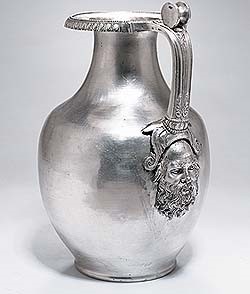Fighting Infection with a Silver Bullet
Published: 3rd October 2019
Silver in Healthcare
Silver is a white precious metallic element found in many parts of the world in soil, rocks, water and the atmosphere. The word silver itself conjures up images of coins, ornaments and jewellery; for over 4,000 years the element has been alloyed with base metals, shaped and polished into possessions of value. Indeed, the Sheffield Assay Office would not exist without the skilled silversmiths 250 years ago petitioning Parliament for a local Assay Office.
But there is another application for this metal, which utilises its natural antimicrobial properties. Early civilisations discovered that water preserved in silver vessels remained much more acceptable for consumption than when kept in traditional earthenware, and silver coins were often placed in water containers by ship’s captains. In fact, the term ‘born with a silver spoon in the mouth’ comes from the use of silver cutlery and utensils. Babies fed with silver spoons in the 18th century were believed to be healthier than those fed with utensils made with other materials.

In the last 150 years we have seen further clinical evidence to support the theory that silver can help protect the human body from infectious diseases. Indeed, silver nitrate was used for many years as an antiseptic until modern antibiotics became widely available. The last 30 years has seen the introduction of sustained silver-ion release products for bone implants, cardiovascular devices, dental products, and wound care.
The antimicrobial properties of silver are due to ‘oligodynamic action’, which is its toxicity to bacterial, fungal and algal cells. Although not fully understood, it is thought that silver works by binding to the proteins within the surface walls of cells, causing disruption. Once inside the cell the silver ions attach to metabolic enzymes which provide nutrients and energy to the cell, starving them of both. The silver ions may also bind to the DNA strands, preventing further replication of the cell.

Silver is used in many different forms such as elemental silver, silver oxide, silver nitrate, silver sulphate, silver salt, silver zeolite, silver zirconium phosphate, silver sulfadiazine and silver nanoparticles. The wide range of products now available include contact layer dressings, foams, fibres, clothes, mats, films, meshes, alginates, gauze, hydrofibres, powders, hydrogels, collagen based materials and hydrocolloids. Each form and product has its own specific application, depending on the wound being treated.
Our Analytical Services division has over 15 years’ experience of testing medical products. We work with some of the world’s leading brands to ensure their products maintain the highest level of quality control to satisfy the strict regulatory requirements.
Using either ICP-OES (inductively coupled plasma optical emission spectroscopy) or ICP-MS (inductively coupled plasma mass spectroscopy) instruments, we can accurately measure the silver content of these materials as well as testing for trace elements such as As, Cd, Co, Cu, Fe, Hg, Mg, Na, Ni, Pb, Sn & Zn. We can also measure the release of silver from these materials into simulated wound fluid over a series of time points.
.jpg)
Our test methods can be tailored to individual customer requirements, with validation criteria including accuracy, precision, repeatability, reproducibility and limits of detection. As a UKAS accredited laboratory, you can be sure that we have the people, facilities, technical expertise, management systems and track record to undertake your work professionally and competently.
The Sheffield Assay Office was established in 1773, under an Act of Parliament and today the company assays and hallmarks the precious metals - silver, gold, platinum and palladium. Sheffield Assay Office is one of only four UK assay offices who all work to uphold the Hallmarking Act of 1973 and continue to ensure consumer protection for customers purchasing precious metals.
To find out more about the whole range of services offered by Sheffield Assay Office, such as our hallmarking and analytical services, please email us at info@assayoffice.co.uk or complete the contact form on our website at http://www.assayoffice.co.uk/contact-us ,
Sign up here to all the latest news from Sheffield Assay Office direct to your inbox